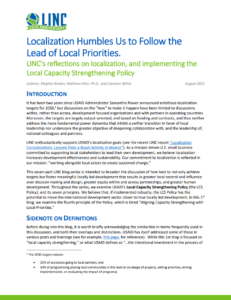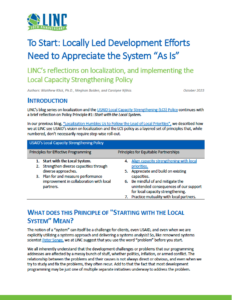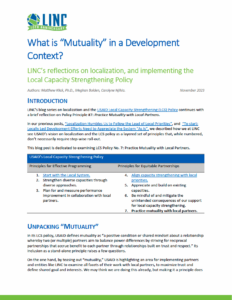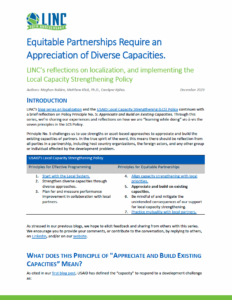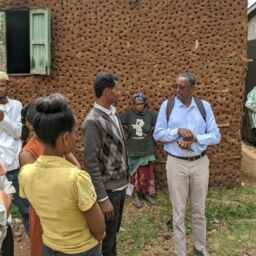LINC was founded with a commitment to what is today called “locally led development.” As such, we are pleased to see the development community embrace this idea and navigate its intricacies, inclusive of USAID’s still young Local Capacity Strengthening (LCS) policy.
As part of our commitment to regularly examine our own work and the challenges of ‘doing’ localization, and to critically reflect on localization as an initiative, we are producing a series of blog posts dedicated to examining the LCS policy.
We want to know what the international development community thinks, so we hope these blogs ignite fruitful conversations that lead to more thoughtful and effective partnerships with our host-country counterparts, and more aligned development priorities.
Blog No. 1
Localization Humbles Us to Follow the Lead of Local Priorities
“How do we know what local priorities are in local systems? How do we know what capacities local actors already have? How do we know which local actors want support to strengthen their capacities? What capacities do local actors already have?” These are some of the questions that guided the discussion for this first blog.
In this blog, we share our experience with and recommendations for implementing principle No. 4 of the LCS policy: “Align Capacity Strengthening with Local Priorities”. (We also discuss why we start with No. 4!).
Full post here.
Blog No. 2
To Start: Locally Led Development Efforts Need to Appreciate the System “As Is”
As development professionals, we now understand that the most effective way to solve development problems is by allowing local stakeholders to lead their own solutions. To better support our local counterparts, at LINC, we take a local systems approach in our work. It involves not only information gathering but listening to the people directly affected by the problem and immersing ourselves in their realities.
In the second post of LINC’s localization series, we share our thoughts and experience in implementing USAID’s LCS policy principle No. 1: “Start with the Local System”.
Full post here.
Blog No. 3
What is “Mutuality” in a Development Context?
When implementing “mutuality” in international development, we as implementing partners should strive for equity, not equality, with our host-country counterparts.
In the third post of LINC’s localization series, we share our thoughts and what we are doing for implementing principle No. 7 of the LCS policy: “Practice mutuality with local partners”.
Full post here.
Blog No. 4
Equitable Partnerships Require an Appreciation of Diverse Capacities.
What kind of capacities could be useful in addressing a local development challenge? Well, it depends, and the title in our latest blog may give our readers a hint.
In the fourth entry of LINC’s localization series, we reflect on USAID’s LCS policy principle No. 5: “Appreciate and build on existing capacities”.
Full post here.
Blog No. 5
Capacity Strengthening: Engaging Local Actors in Meaningful Ways
“How is “capacity” defined, and who gets to define it? Is “capacity” limited to certain tools or knowledge areas, or is it limited to sophisticated management systems?”
In the fifth entry of LINC’s Localization Series, we reflect on how conceptualizing “capacity” is one of the challenges that development implementing partners face when applying USAID’s Local Capacity Strengthening Policy Principle No. 2: “Strengthen diverse capacities through diverse approaches”.
Full post here.
Blog No. 6
Supporting Local Actors to Plan for and Measure Performance Outcomes That Are Significant to Them, and Their Local Systems.
In the sixth blog of LINC’s Localization Series, we reflect on how USAID’s Local Capacity Strengthening Policy Principle No. 3: “Plan for and measure performance improvement in collaboration with local partners” is really about accompanying the goal-setting, monitoring, and evaluation tools and processes defined and agreed on with the local communities and stakeholders that we support.
Full post here.

